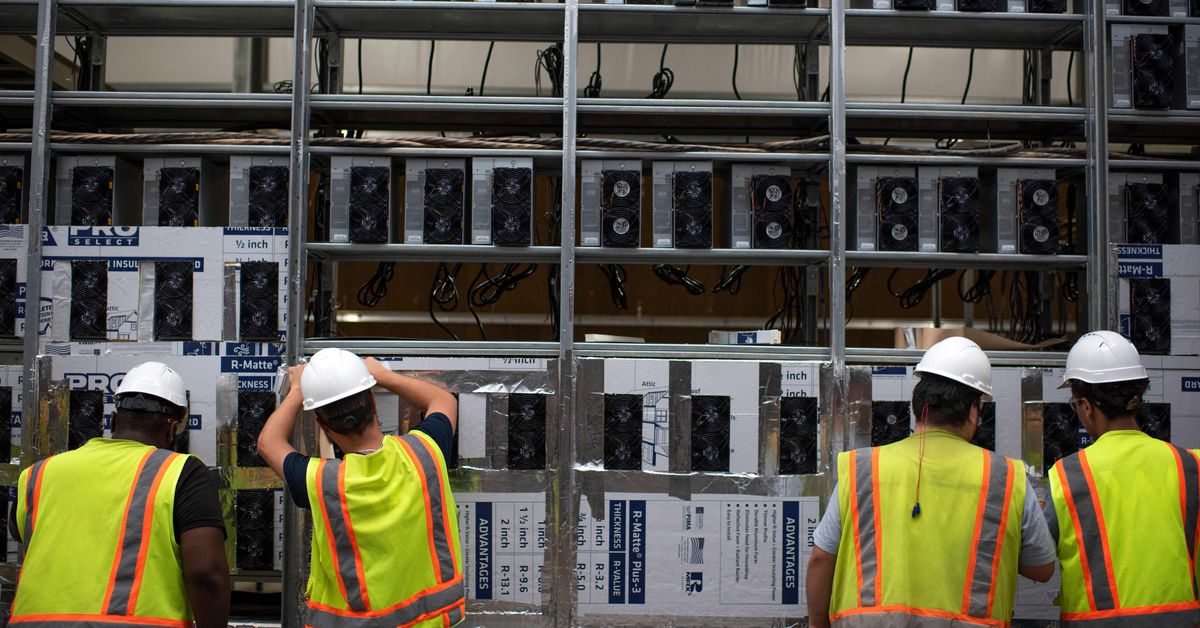Democratic lawmakers ask federal agencies to crack down on crypto mining
Workers install a new row of Bitcoin mining machines at the Whinstone US Bitcoin mining facility in Rockdale, Texas, on October 9, 2021. | Photo by MARK FELIX/AFP /AFP via Getty ImagesOn Friday, Elizabeth Warren and other Democratic members...

On Friday, Elizabeth Warren and other Democratic members of Congress sent a letter to two federal regulators, urging them to take action on the explosion of Bitcoin mining in the US.
Sent to the heads of the Environmental Protection Agency and Department of Energy, the letter was spurred by preliminary investigation from lawmakers, which found that just a handful of cryptominers use an enormous amount of energy. In response, the lawmakers ask the agencies to require that crypto-mining companies share data on their energy use and emissions.
Seven of the biggest crypto-mining companies in the US have the collective capacity to use over 1 gigawatt of electricity, according to the letter. That’s the equivalent of two standard coal plants or, as the letter puts it, almost enough to power all the residences in Houston. That’s just the tip of the iceberg, since there are no federal measures in place to capture a complete picture of the environmental impact of the recent boom in US crypto-mining.
Crypto-mining has exploded in the US over the past year, driven in part by China’s 2021 crackdown on the practice in. The US is the biggest hub globally for mining Bitcoin, typically running data centers around-the-clock to mine the currency. These data centers are filled with specialized hardware racing to solve complex equations in order to verify transactions, earning Bitcoin in return. All that computing power gobbles up vast amounts of electricity — and produces pollution as a result.
Moving from China to the US has likely made the Bitcoin network even dirtier, with abundant hydropower in China replaced by coal and gas-derived electricity from the US grid.
All this has policymakers worried about what impact crypto mining will have on the country’s climate change goals, as well as on electricity bills. The practice has already inflated electricity prices in New York, for instance. In an extreme example, residents in Plattsburgh, NY saw their utility bills rise by up to $300 in the winter of 2018 after Bitcoin miners set up shop nearby.
Last month, New York State passed a bill imposing a two-year moratorium on new permits for fossil fuel power plants used to mine energy-intensive currencies. The bill has not yet been signed into law, but the state has also taken regulatory actions to discourage mining. In June, New York also denied a renewed air permit to an embattled power plant, the Greenidge Generating Station on the grounds that its use for Bitcoin-mining “would be inconsistent with the statewide greenhouse gas emission limits.”
Greenidge was one of the companies Warren and other Democratic lawmakers sent queries to back in January, demanding information on their energy use and emissions. Greenidge was responsible for 273,326 tons of carbon dioxide emissions over a year, equivalent to the tailpipe emissions from almost 60,000 cars, according to the new letter released today.
Still, the impact of crypto-mining in the US is way bigger than what the letter details. For starters, “None of the companies provided full and complete information in response to our questions,” the lawmakers wrote.
There are other clues as to how much energy crypto mining companies are actually gobbling up across the nation. In Texas, another hot spot for Bitcoin mining in the US, the crypto mining industry collectively freed up about 1 gigawatt of energy after temporarily powering down this week. The companies ramped down operations in response to an appeal from the state’s grid operator to conserve energy as a searing heatwave threatened to overwhelm the grid.
That hunger for energy is growing fast. “There are over 27 gigawatts of crypto load that is working on interconnecting over the next four years,” a spokesperson for the Electric Reliability Council of Texas (ERCOT) told The Verge in an email this week (the spokesperson declined to be named). That’s an impossibly large load to add to the grid in such a short time frame, experts tell The Verge.
“The results of our investigation, which gathered data from just seven companies, are disturbing, with this limited data alone revealing that cryptominers are large energy users that account for a significant – and rapidly growing – amount of carbon emissions,” the letter to the EPA and Department of Energy says. It was signed by Senators Elizabeth Warren (D-MA), Sheldon Whitehouse (D-RI), Jeff Merkley (D-OR), and and Ed Markey (D-MA), and Representatives Rashida Tlaib (D-MI), and Jared Huffman (D-CA).

 BigThink
BigThink 
































